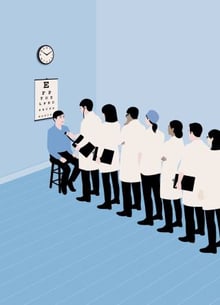- Privacy Policy
- Terms & Conditions
- Contact us
- ©Isabel Healthcare 2025
Why the symptom checker is a key tool to enable ‘Choosing Wisely’
 The UK version of the US Choosing Wisely campaign was launched this week. The aim of the campaign is to reduce wasteful medical practices. The campaign was launched by the Academy of Medical Royal Colleges which published an accompanying briefing document. An article in the BMJ was published to coincide with the launch.
The UK version of the US Choosing Wisely campaign was launched this week. The aim of the campaign is to reduce wasteful medical practices. The campaign was launched by the Academy of Medical Royal Colleges which published an accompanying briefing document. An article in the BMJ was published to coincide with the launch.
Choosing Wisely asks medical organisations (such as medical royal colleges in the UK) to identify "tests or procedures commonly used in their specialty, the necessity of which should be questioned and discussed". These are compiled into lists, and the “top five” interventions for each specialty should not be used routinely or at all.
This is a great initiative but the obvious question to ask is, why should we need this campaign? Why would doctors be making diagnoses, ordering tests and prescribing treatments for us that have been proven to do no good at all and, in many cases actually do harm, especially when resources are stretched?
The Academy’s own rationale is revealing:
-
There is evidence of a considerable volume of inappropriate clinical interventions
-
The reasons for this are complex and various but form part of a culture of over-medicalisation
-
The result is sub-optimal care for patients which, at best, adds little or no value and, at worst, may cause harm
-
This is, therefore an issue for clinicians about the quality and appropriateness of care
-
Additionally, in a system where resources are constrained it is unethical as well as inefficient to provide treatments or interventions which have no clinical value.
-
Ensuring inappropriate clinical interventions are avoided required mature conversations between individual clinicians and their patients about the value, effectiveness and risk of particular treatments and the range of alternative options
There are two key forces that have allowed this situation to develop. The first is the way healthcare is paid for and the second is the weak position of the consumer or patient.
For a generation healthcare has been paid for based on activity, providing little incentive for clinicians to focus on the appropriateness of care. Doctors get paid for doing more, not less. With Accountable Care in the USA and Clinical Commissioning Groups in the UK, this is changing, albeit slowly.
Patients are generally not well informed about their health and have a poor understanding of risk, particularly the difference between absolute and relative risks, coupled with the fact they are often feeling weak and vulnerable at the time they are having to make decisions about their treatment.
As the BMJ article states, “Diagnosis drives treatment” and so we are back to the issue of how the patient becomes sufficiently informed about his/her diagnosis to challenge their doctor? I believe that this again demonstrates how the Isabel symptom checker is a key tool to enable patients to become better informed. Patients are the experts on their symptoms and how they have changed over time. The symptom checker helps them research what they could mean and what they should be asking their doctor.
The need for a Choosing Wisely campaign simply shows that patients cannot leave decisions about their diagnosis and treatment solely up to their doctors and should be aware that the incentives in the health system still encourage many doctors to over test and treat.
Thankfully, in the UK we are not at the absolute levels of over treatment seen in the US but we still show wide variations in the use of medical and surgical interventions and are certainly not at the level you would expect with a single payer national health system. For a US perspective it is timely that The New Yorker magazine has just published another wonderful essay on this very topic by Atul Gawande entitled “Overkill”. He agrees that patients should get more informed but it's not an easy task.
“The virtuous patient is up against long odds, however. One major problem is what economists call information asymmetry. In 1963, Kenneth Arrow, who went on to win the Nobel Prize in Economics, demonstrated the severe disadvantages that buyers have when they know less about a good than the seller does. His prime example was health care. Doctors generally know more about the value of a given medical treatment than patients, who have little ability to determine the quality of the advice they are getting. Doctors, therefore, are in a powerful position. We can recommend care of little or no value because it enhances our incomes, because it’s our habit, or because we genuinely but incorrectly believe in it, and patients will tend to follow our recommendations.”
Dowload our free symptom checker app on apple or android now, and start to get informed about your own health:
Image attribution: Anna Parini, via the New Yorker 'Overkill' article

Jason Maude
Jason is the CEO and Co-founder of Isabel. Prior to co-founding Isabel, Jason spent 12 years working in finance and investment banking across Europe. His daughter, Isabel, fell seriously ill following a misdiagnosis in 1999 and this experience inspired Jason to abandon his city career and create Isabel Healthcare Ltd.
Subscribe Here!
Recent Posts
Isabel DDx Companion with ChatGPT Integration - to help you diagnose even faster
At Isabel Healthcare, we’ve always been driven by one goal: to make clinical reasoning faster,..Virtual Triage: Do more questions lead to better patient outcomes?
One of the common misconceptions related to virtual triage / symptom checker tools is that the more..List Of Categories
- Differential Diagnosis Decision Support
- Differential diagnosis
- Symptom Checker
- Symptoms
- Medical Error
- Patient Disease Information
- Disease
- Clinical Decision Support
- Diagnostic Decision Support
- Isabel 1 Minute Read
- Diagnosis Error
- Diagnosis Skills Cases
- Healthcare Informatics
- Clinical Reasoning
- Evidence-based Medicine
- Medical Education
- Patient Engagement
- Symptom Triage
- Nurse Practitioner Education
- Nursing Decision Support
- Partnership
- Public Health
- COVID-19
- EHR
- Patient Empowerment
- Patient Safety
- rare disease

Start your FREE Trial today
Try the Isabel Pro DDx generator for 30-days - no payment card details required.




